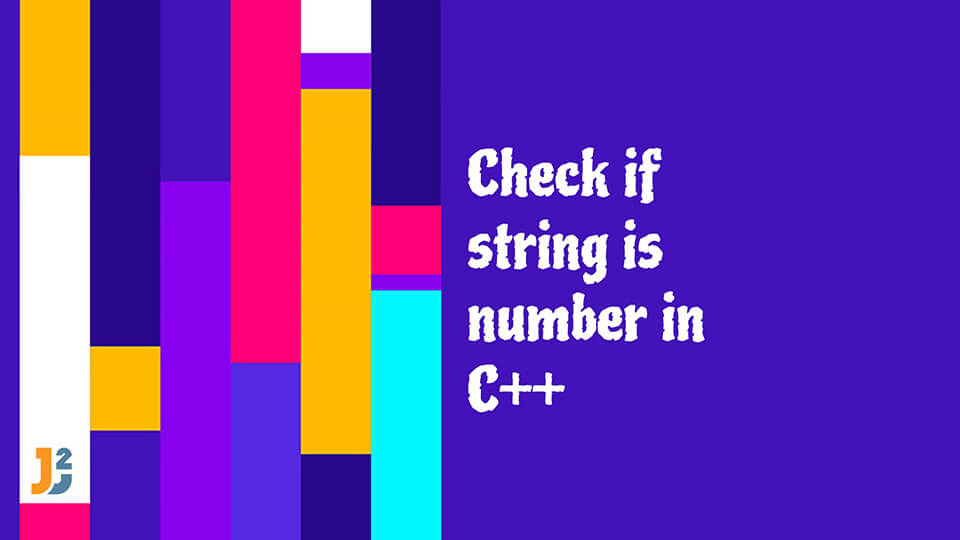Table of Contents
1. Introduction to the Problem Statement
In C++ programming, a common task is determining whether a given string represents a valid number. This challenge can arise in various contexts, such as input validation, data parsing, or before performing arithmetic operations.
Our Goal: To check if a string like "123" or "45.67" is a valid number.
Expected Output: A boolean value – true if the string is a number, false otherwise.
We will explore multiple methods to accomplish this task, assess their performance, and discuss their suitability in different scenarios.
2. Using std::istringstream
One standard approach is to use std::istringstream from the <sstream> header.
|
1 2 3 4 5 6 7 8 9 10 11 12 13 14 15 16 17 18 |
#include <iostream> #include <sstream> #include <string> bool isNumberIstringstream(const std::string& str) { std::istringstream iss(str); double val; iss >> val; return iss.eof() && !iss.fail(); } int main() { std::string testStr = "123.45"; std::cout << "Using std::istringstream: " << isNumberIstringstream(testStr) << std::endl; return 0; } |
Explanation: The function isNumberIstringstream checks if the string "123.45" can be completely read as a double. Since it can, the function returns true (represented as 1 in C++ boolean context).
Performance: Generally efficient for most cases.
Use Cases: Suitable for a wide range of applications, particularly where standard library solutions are preferred.
3. Using std::stod and Exception Handling
Another method involves std::stod (string to double conversion) wrapped in a try-catch block.
|
1 2 3 4 5 6 7 8 9 10 11 12 13 14 15 16 17 18 19 20 21 22 23 |
#include <iostream> #include <string> #include <stdexcept> bool isNumberStod(const std::string& str) { try { size_t pos; std::stod(str, &pos); return pos == str.length(); } catch (const std::invalid_argument& ia) { return false; } catch (const std::out_of_range& oor) { return false; } } int main() { std::string testStr = "123.45"; std::cout << "Using std::stod: " << isNumberStod(testStr) << std::endl; return 0; } |
Explanation: isNumberStod tries to convert the string "123.45" to a double using std::stod. This conversion is successful, and the entire string is processed (pos == str.length()), so the function returns true.
Performance: Comparable to std::istringstream, but may be slightly slower due to exception handling.
Use Cases: Good when you need more control over error handling, particularly in larger applications with robust error management.
4. Using Regular Expressions
For more complex scenarios, regular expressions can be used.
|
1 2 3 4 5 6 7 8 9 10 11 12 13 14 15 16 |
#include <iostream> #include <regex> #include <string> bool isNumberRegex(const std::string& str) { std::regex numberRegex("^[-+]?([0-9]*\\.[0-9]+|[0-9]+)$"); return std::regex_match(str, numberRegex); } int main() { std::string testStr = "123.45"; std::cout << "Using Regular Expressions: " << isNumberRegex(testStr) << std::endl; return 0; } |
Explanation: isNumberRegex uses a regular expression to match the string against a numeric pattern. The string "123.45" matches the pattern, so the function returns true.
Performance: Slower than previous methods, especially for short strings or in tight loops.
Use Cases: Ideal for scenarios where the definition of a number is complex or non-standard (like including/excluding scientific notation).
5. Custom Parsing Method
For educational purposes, a manual parsing method can be implemented.
|
1 2 3 4 5 6 7 8 9 10 11 12 13 14 15 16 17 18 19 20 21 22 23 24 25 26 27 28 29 |
#include <iostream> #include <string> #include <cctype> bool isNumberCustom(const std::string& str) { if(str.empty()) return false; size_t i = 0; if (str[0] == '+' || str[0] == '-') i = 1; bool hasDigits = false, hasDecimalPoint = false; for (; i < str.size(); ++i) { if (std::isdigit(str[i])) { hasDigits = true; } else if (str[i] == '.' && !hasDecimalPoint) { hasDecimalPoint = true; } else { return false; } } return hasDigits; } int main() { std::string testStr = "123.45"; std::cout << "Using Custom Parsing Method: " << isNumberCustom(testStr) << std::endl; return 0; } |
Explanation:
isNumberCustommanually checks each character of"123.45"to determine if it is a valid number. It usesstd::isdigit()to check if a character is a digit.std::isdigit(char c): This function checks if the charactercis a digit (0to9). It is a part of the<cctype>header and is useful for character-by-character analysis, especially in custom parsing logic as seen in this method.- The string
"123.45"passes all the checks (digits and at most one decimal point), leading the function to returntrue.
Performance: Can be efficient, particularly for simple cases.
Use Cases: Useful when you want full control over what constitutes a number, or in environments where library usage is restricted.
6. Conclusion
In this article, we’ve explored various methods to check if a string is a number in C++. std::istringstream and std::stod provide standard library solutions that are efficient for most cases. Regular expressions offer flexibility for complex number formats but at a performance cost. The custom parsing method, while less efficient, provides deeper insights and full control over the parsing logic.



